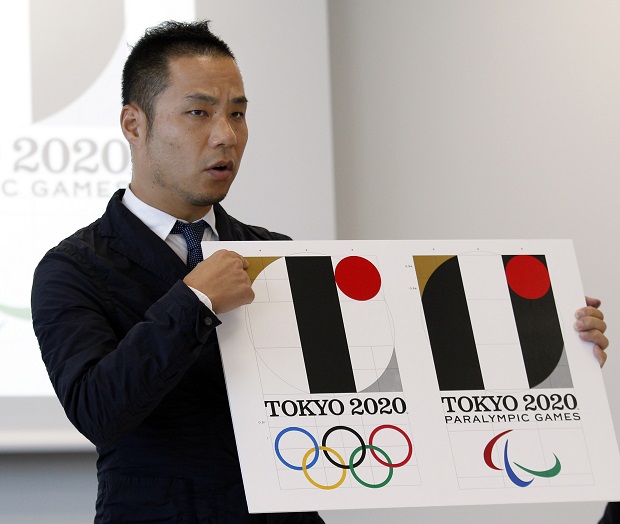Japan organizers defend designer over Olympics logo, deny it’s copied

In this Aug. 5, 2015, file photo, Japanese designer Kenjiro Sano gives a detailed explanation of how he came up with his logo, left, for the 2020 Tokyo Olympics at a press conference in Tokyo. Tokyo Olympic organizers defended Sano in a logo scandal Friday, Aug. 28, 2015, denying allegation his design for the 2020 Games was taken from a Belgian theater. The organizers disclosed Sano’s initially submitted logo, saying its emphasis on “T” shape had no resemblance to that of Theater de Liege and that a circle on the background was added later when his design was touched up. AP FILE PHOTO
TOKYO — Tokyo Olympic organizers defended a Japanese designer in a logo scandal Friday, denying allegations his design for the 2020 Summer Games was copied from a Belgian theater.
At a news conference in Tokyo, the organizers disclosed designer Kenjiro Sano’s initially submitted logo, saying its emphasis on a “T” shape bore no resemblance to that of Theater de Liege.
Article continues after this advertisementThey said a circle on the background was added later as the design was amended after the organizers found a logo that carried some similarity during their trademark search around the world to avoid any legal infringement.
The Belgian logo did not turn up during their three-month search because it wasn’t a registered trademark, they said.
“We are convinced that the design of the Tokyo Olympics logo is original,” said Toshio Muto, director general of the Tokyo organizing committee.
Article continues after this advertisementKazumasa Nagai, a renowned graphic designer who headed the selection committee for the 2020 Olympic logo, said it is not unusual to find small similarities in designs, especially in those comprised of simple shapes like circles, triangles and bold letters, like Sano’s.
“Under normal circumstances, it’s not such a big deal, but this (logo) is for the Olympics which reaches everywhere and gets so much attention. I think that’s why it has caused a problem,” he said. “Even though it is said to have (a) little resemblance, I believe it is purely by coincidence.”
The organizers said Sano’s design was outstanding and didn’t consider other options, and refused to disclose the other two of the top three designs.
A Belgian designer is suing the International Olympic Committee over the logo. The trial begins Sept. 21.
Sano denied the claim in early August. But he got embroiled in several other plagiarism allegations.
He eventually acknowledged some of the designs used in a brewery promotional campaign carried copies of others’ works, though he held his assistants responsible.
A zoo in Nagoya in central Japan has sought an investigation into its Sano-designed logo after being told it resembled that of Costa Rica’s national museum. Sano’s office has denied the allegation.
Japanese organizers said plans to promote Sano’s logo are unchanged. Muto, however, declined to give details of the promotional plans except that their launch is targeted around October. He declined to say if the lack of details was linked to the lawsuit.
“It’s a powerful and simple design,” Muto said of the disputed logo. “Despite all the development, we will continue our effort so that the people would keep using the logo.”